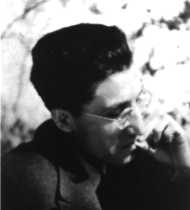“No se recuerdan los días, se recuerdan los momentos.”
The Moon and the Bonfire
Variante: No se recuerdan los días, se recuerdan los momentos
Cesare Pavese fue uno de los escritores italianos más importantes del siglo XX.

“No se recuerdan los días, se recuerdan los momentos.”
The Moon and the Bonfire
Variante: No se recuerdan los días, se recuerdan los momentos
The Moon and the Bonfire
Dialogues with Leucò
“la literatura es la defensa frente a las ofensas de la vida”
Dialogues with Leucò
“You cannot insult a man more atrociously than by refusing to believe he is suffering.”
This Business of Living (1935-1950)
Fuente: The Beach (1941), Chapter 6, p. 36
“What is to come will emerge only after long suffering, long silence.”
This Business of Living (1935-1950)
“All sins have their origin in a sense of inferiority, otherwise called ambition.”
This Business of Living (1935-1950)
“You've got to understand life, understand it when you're young.”
Fuente: The Beach (1941), Chapter 4, p. 27
This Business of Living (1935-1950)
“The real affliction of old age is remorse.”
Fuente: The moon and the bonfire (1950), Chapter VIII, p. 49
“Love has the faculty of making two lovers seem naked, not in each other's sight, but in their own.”
This Business of Living (1935-1950)
Fuente: The moon and the bonfire (1950), Chapter XXIX, p. 167
Fuente: The moon and the bonfire (1950), Chapter XI, p. 67
Fuente: The devil in the hills (1949), Chapter 18, p. 354
Fuente: The moon and the bonfire (1950), Chapter X, p. 60
Fuente: Among women only (1949), Chapter 9, p. 212
Fuente: The devil in the hills (1949), Chapter 9, p. 319
Incipit
The moon and the bonfire (1950)
Fuente: The devil in the hills (1949), Chapter 5, p. 306
“But all years are stupid. It's only when they're over that they become interesting.”
Fuente: The Beach (1941), Chapter 9, p. 48
“Not believing in anything is also a religion.”
Fuente: The house on the hill (1949), Chapter 15, p. 139
This Business of Living (1935-1950)